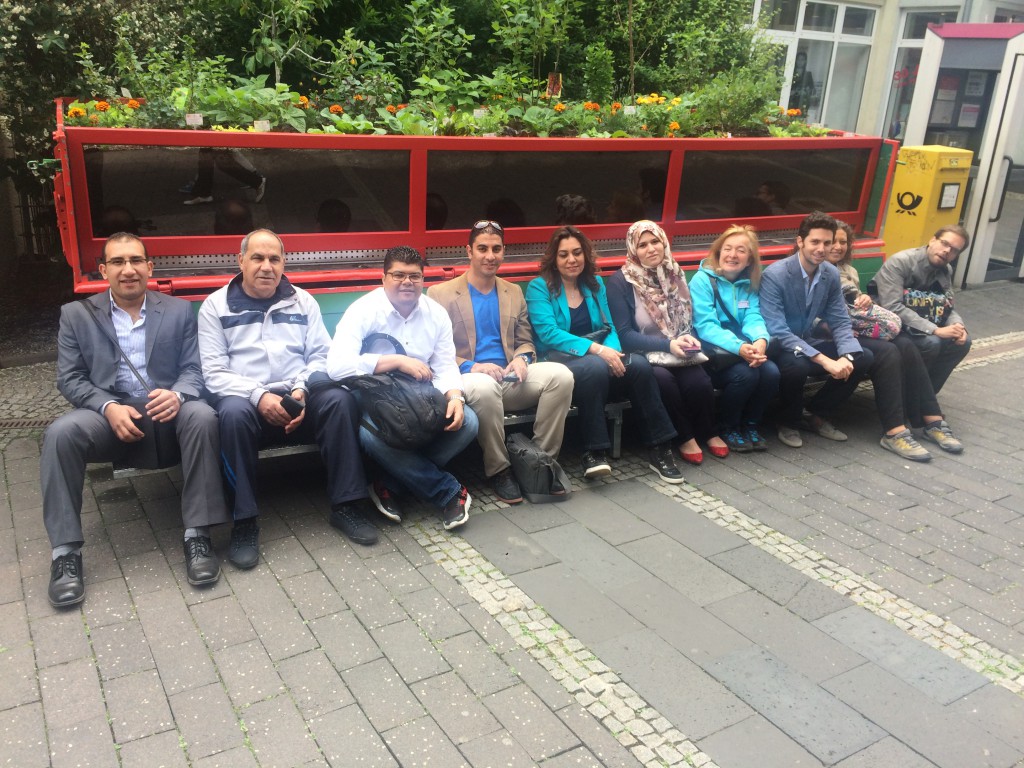“How can cities better adapt to climate change on a local scale and what institutional background is needed therefore? How are concepts of green and sustainable infrastructure integrated into the city scape? What is the relation between urban agriculture and food security? How can exchange platforms and international networks enhance the climate change adaptation performance of cities around the world?”
All these questions were tackled within the study tour called “German Perspectives on Climate Change Adaptation in Cities” which was organized by the Climate Change Component (C2) of the Participatory Development Programme in Urban Areas (PDP) from Sunday, the 7th of June to Friday, the 12th of June in Germany. There, unique insights on climate change adaptation from a German perspective based on an international scale were offered. The study tour was accompanied by acknowledged experts from the most important fields of climate change adaptation in Egypt. Namely, representatives from the Ministry of Urban Renewal and Informal Settlements (MURIS), the Egyptian Environmental Affairs Agency (EEAA), the Governorates of Cairo, Giza and Qalyubia, as well as the private sector, represented by Schaduf Company and MEGAWRA on behalf of the civil society.
The study tour was organized around the annual “Resilient Cities Conference” of ICLEI – the world leading organization for climate change adaptation on a local level. The outstanding highlight of the 3 days of conference was the GIZ presentation about “Adaptation capacities in densely populated areas”. Thereby, PDP/C2’s recent climate change adaptation project which has been successfully initiated in one of Cairo’s informal settlements (Ezbet el-Nasr) was introduced to and further discussed with the audience. The other sessions were evolving around various themes, such as food security, health implications of climate change, multi-stakeholder approaches for building resilience, ect.
On the first day of the study tour, a meeting with ICLEI representative Ms. Eva Madeira was held in order to give the participants the possibility to grasp a comprehensive overview of the ICLEI activities around the world. The meeting motivated the participants to discuss the possibility of engaging the Greater Cairo Region in upcoming ICLEI activities as well as possibly becoming the first city-member of the Arab region.
In order to enhance the theoretical input of the conference, a half-day trip was organized to the city of Andernach, which is known as the “Edible City”. There, the delegation members were introduced to the concept of city-wide urban agriculture regarding its ecological, economic and social aspects.
In addition to the attendance of the conference in Bonn, the second part of the study tour was taking place in Stuttgart, which is the partner city of Cairo Governorate. The city has put great efforts in the last years to develop a climate-sensitive agenda for the whole metropolitan region. This engagement resulted in the production of a “Climate Atlas” functioning as basis for the development of a city-wide climate change adaptation strategy. In order to successfully challenge the heat island effect and high pollution rates, which Stuttgart is known for due to its location in a valley, the strategy includes green corridors as well as green rooftops and fresh air channels. The “Green Living Room” project in the neighbouring city of Ludwigsburg that the delegation was also visiting in a half-day trip perfectly exemplified the planning and implementation of urban green infrastructure for enhancing the micro climate in the urban context. Both, the green living room in Ludwigsburg as well as Stuttgart, provided the delegation with particularly interesting insights on climate change adaptation as direct links could be drawn to the case of the Greater Cairo Region.
Overall, the study tour was a great success as many promising connections and networks could be initiated and deepened. The delegation members were provided with manifold information, new aspects and promising approaches for a better climate change adaptation on the local level, but from an international perspective. The study tour was also a good opportunity for the participants to exchange about mutual future cooperation between national and local levels and even with the private sector. Last but not least, the particular strength of the study tour was the possibility for the participants to gain real hands-on experience and to perceive personally the positive impact of small scale measures for climate change adaptation.


